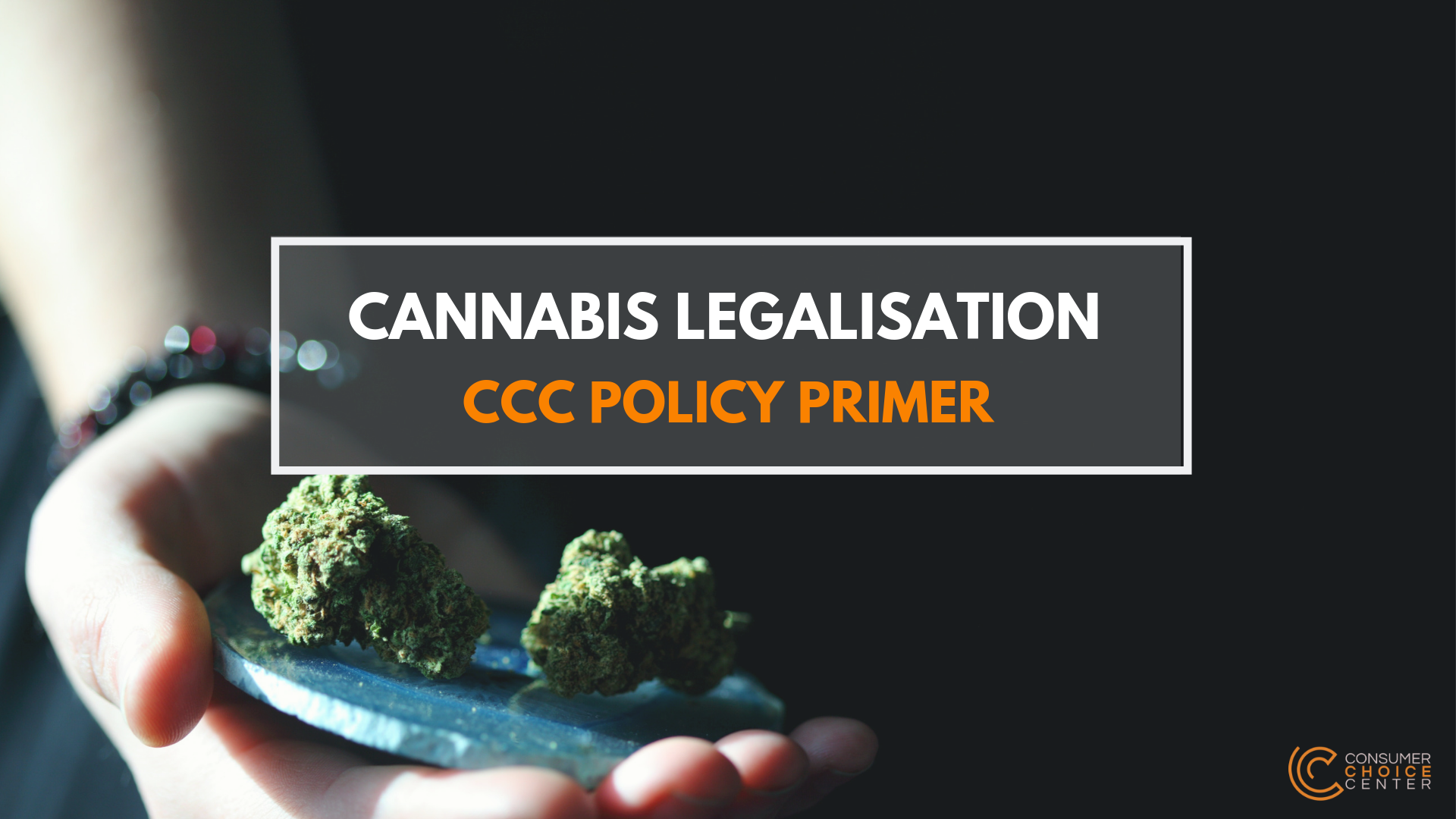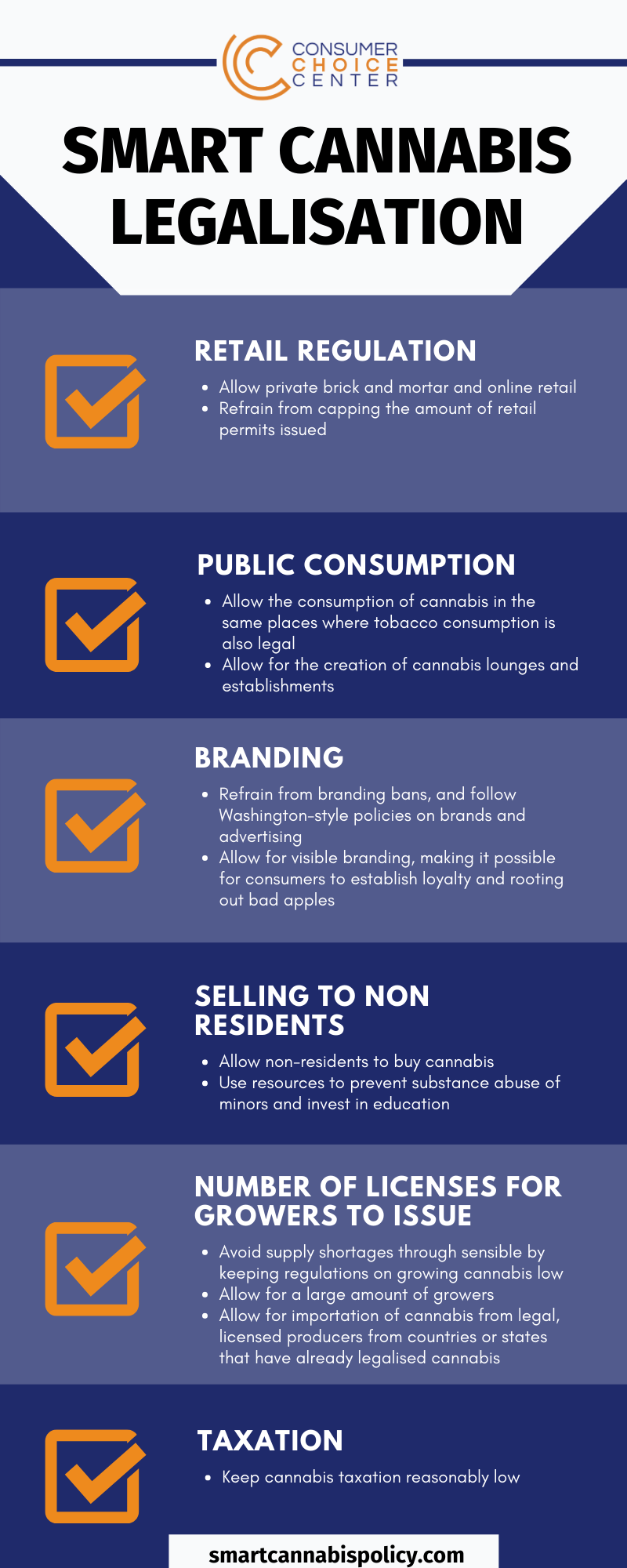By David Clement, Yaël Ossowski, Bill Wirtz, Fred Roeder
09 January 2019
Summary:
- Legalizing cannabis for medical and recreational consumption has boosted consumer choice and, at the same time, successfully deterred continued crime and black market activity in several parts of North America. The Consumer Choice Center welcomes cannabis legalization as a step towards more consumer choice, but stresses the importance of smart regulatory policy in each jurisdiction where it is considered.
- Thanks to our experience in working on cannabis legalization in several U.S. States and Canada, we would like to share the following lessons and policy recommendations for the dozens of European, South American, Asian, and African countries now considering legalization of medical or recreational cannabis.
Retail Regulation:
- Allow private brick and mortar and online retail
- Refrain from capping the amount of retail permits issued
Public Consumption:
- Allow the consumption of cannabis in the same places where tobacco consumption is also legal
- Allow for the creation of cannabis lounges and establishments
Selling to Non-Residents:
- Allow non-residents to buy cannabis
- Use resources to prevent substance abuse of minors and invest in education
Taxation:
- Keep cannabis taxation reasonably low
Number of Licenses for Growers to Issue:
- Avoid supply shortages through sensible by keeping regulations on growing cannabis low
- Allow for a large amount of growers
- Allow for importation of cannabis from legal, licensed producers from countries or states that have already legalized cannabis
Branding:
- Refrain from branding bans, and follow Washington-style policies on brands and advertising
- Allow for visible branding, making it possible for consumers to establish loyalty and rooting out bad apples
Conclusion:
More jurisdictions are now opting for the legalization of medical or recreational cannabis products. By following an approach of smart regulation and thus allowing consumers to access legal cannabis products in a more convenient and safe way than illegal cannabis products, black markets and organized crime can be eradicated.
If legalization is executed in a half-hearted approach that strays from these recommendations, we fear that illegal options will remain available and thus jeopardize public support for legalization overall. However, by following these guidelines, states can ensure they will offer a cannabis market that furthers consumer choice and safety.Keep


About the Authors:
David Clement is an Ontario-native and North American Affairs Manager of the Consumer Choice Center. He is featured regularly on Canadian TV, radio, and print media advocating for the smart regulation of cannabis. He holds a Master’s Degree in Political Science from Wilfrid Laurier University in Waterloo, Ontario.
Yaël Ossowski is a Quebec-born journalist who grew up in North Carolina. He is Deputy Director of the Consumer Choice Center and writes about consumer policy in English and French in both Canada and the United States. He holds a Master’s Degree in Philosophy, Politics, and Economics from the CEVRO Institute in Prague, Czech Republic.
Fred Roeder is a German Health Economist and Managing Director of the Consumer Choice Center. He has been consulting governments, non profits, and the private sector on patient-centric healthcare reform and opening up healthcare systems in two dozen countries with a strong focus on emerging markets and post-communist countries.
Bill Wirtz is a journalist from Luxembourg, Policy Analyst at the Consumer Choice Center, and regularly writes in French, English, German, and Luxembourgish on consumer-related policies. He is a vocal supporter of cannabis legalization in his home country and is featured regularly in media outlets such as Le Monde, Le Figaro, Die Welt, and RTL.